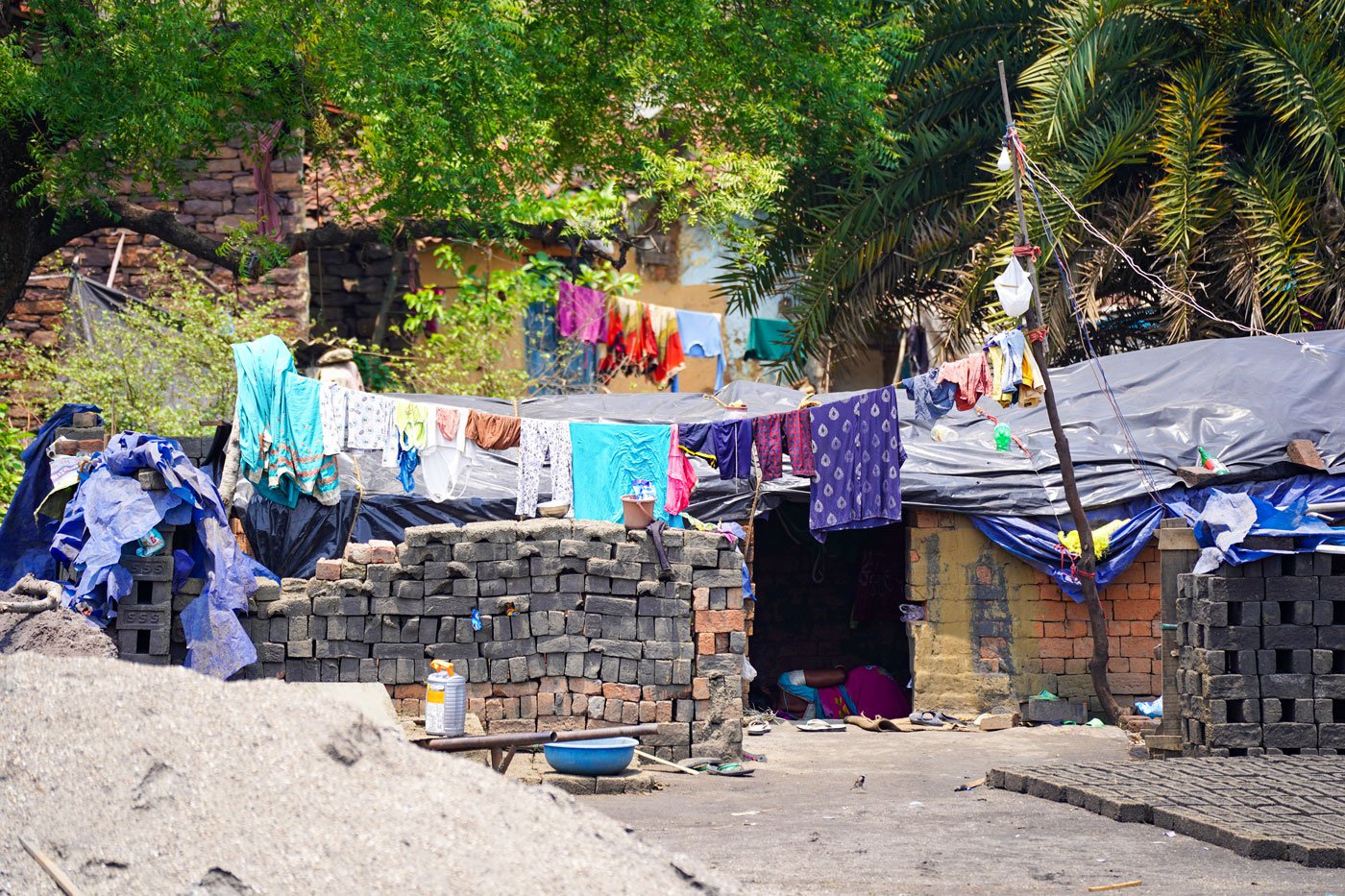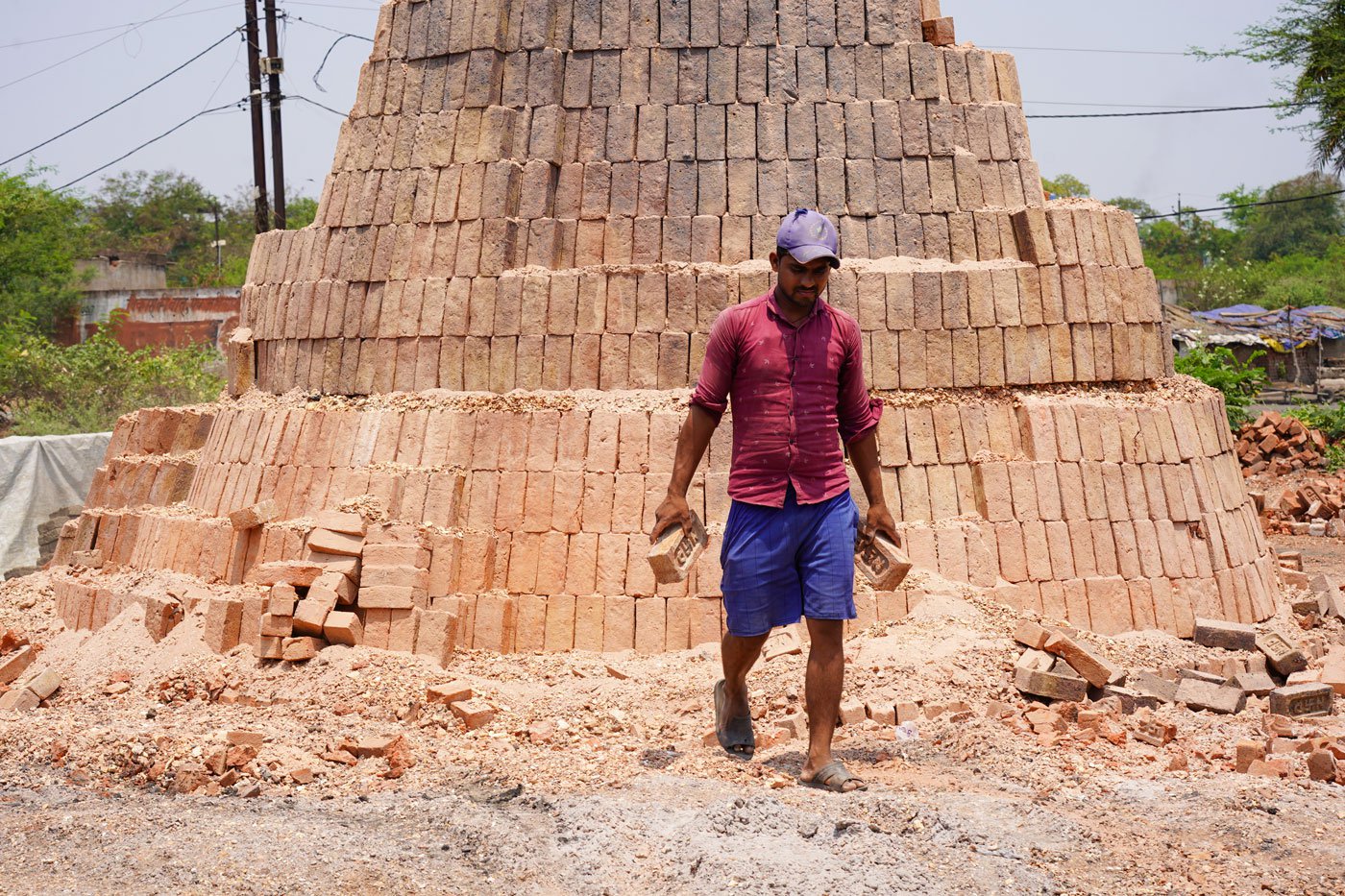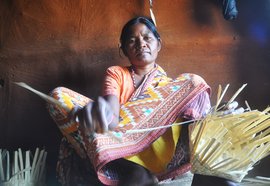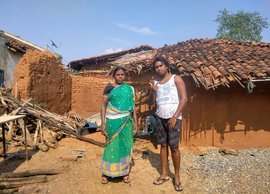It is lunch hour at the brick kilns of Raipur. The workers are either having a quick meal or resting inside their temporary dwellings.
“We are from Satna [Madhya Pradesh],” a woman says, coming out of her mud hut. Most of the workers here are migrants from the neighbouring state; they arrive here in the capital city of Chhattisgarh every year after the harvest season is over in November-December and stay on for six months till May or June. The brick-kiln industry of India employs an estimated 10-23 million workers (Slavery in India’s Brick Kilns, 2017 ).
This year, by the time they return home, there will be a new government at the centre. But it is uncertain if the migrant workers here will have a role in electing their leaders.
“We will be informed when it is time to vote,” the woman, who wished to remain anonymous, tells PARI.
The information will probably be provided by
Sanjay Prajapati, their labour contractor. Standing a little distance away from
the huts, he tells us, “We have no information about the vote in Satna. If we
do, we’ll inform them.” Sanjay and many of the workers here belong to the
Prajapati community (listed as Other Backward Classes in MP).


Left: Once the harvest season ends in the winter, migrant workers from Madhya Pradesh travel to Chhattisgarh to work at brick kilns. They stay here in temporary dwellings for six months until the monsoons. Right: Ramjas is a young labourer from Madhya Pradesh who is here with his wife Preeti. The couple work together at the kiln


Left: Labourers work at the kiln in the morning and and night, taking a break in the afternoon when temperatures soar. Right: Ramjas with Sanjay Prajapati (pink shirt), the labour contractor
Under the unforgiving April sun, where temperatures can touch close to 40 degrees Celsius, workers at the kilns perform the laborious tasks of moulding, firing, carrying and loading bricks. A report of the National Human Rights Commission ( 2019 ) found that labourers who make bricks earn around Rs. 400 daily. If a couple works as a unit, they are paid Rs. 600-700, the report stated. Working as a unit is common among the labourers here.
Ramjas, for instance, is here with his wife Preeti. Sitting under a small shed, the young man in his 20s is busy checking his mobile phone; he's not sure about the date, and says it's sometime in May.
“We used to spend 1,500 [rupees] to go to Satna and vote. It is our right.” Do all the workers go, we ask him. Ramjas pauses and Sanjay cuts in, “ sab jaate hai [they all go],” he says.
Satna went to polls on April 26 and this
reporter spoke to the workers on April 23. None of them had train tickets at
this point.
Ramjas comes from a family of migrant labourers. His father also worked at the brick kilns in Chhattisgarh. Ramjas lost his father when he was in Class 10. The youngest of three brothers and one sister, Ramjas started working after completing school. His elder brothers also work as labourers in their village in Satna district. Ramjas has been working as a migrant labourer for five years and goes home during festivals or in case of emergencies. He stays here even when work at the kiln is over, working odd jobs. According to Census data (2011), Madhya Pradesh saw 24,15,635 people migrating for employment.


Left: Bricks pilled up after firing. Right: Workers leaving in trucks carrying bricks to be supplied to customers

Ramjas wants to cast his vote, but he is not sure when his constituency goes to the polls
But it’s not just
migrant workers from other states, but also from other districts in Chhattisgarh who might miss out on exercising their
democratic rights.
Election campaigns have been subdued here in Raipur, with almost no presence of the Opposition. Posters and banners are nowhere to be seen around the brick kiln, which is located in the outskirts of the city. No loudspeakers announce the arrival of candidates asking for votes.
A woman from Balodabazar district in Chhattisgarh is sitting under a tree, taking a break from work. She is here with her husband and four children. “I voted three-four months back,” she says, referring to the Assembly elections in Chhattisgarh which took place in November 2023. But she says she will go to her village when it is time to vote. During the Assembly elections, the sarpanch of their village had sent word. And 1,500 rupees for travel and food.
“The person who calls us also pays for us,” she says. Under the Raipur Lok Sabha constituency, Balodabazar district is scheduled to vote on May 7.



